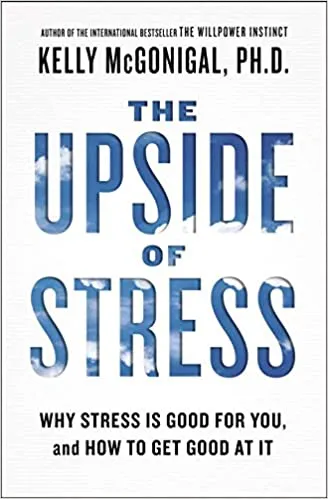What if you could prolong your life and improve your life just by changing your mind about what the stressful events in your life are doing to you? In The Upside of Stress, Kelly McGonigal says you can and I think I believe her. This book is definitely worth reading in my opinion. You can get a taste for it by watching her TED Talk below.

I first heard Kelly McGonigal speak in a TED talk and was enthralled by the idea that changing our perception about stress can change the effect that it has on you. I have since read The Upside of Stress and I also got to see her speak at a convention of the AAFP and I continue to incorporate these ideas into my work with patients.
She talks about a study done by Whitney P. Witt PhD who found that the perception that stress negatively affects your health was associated with premature death. So, in other words, it’s the belief that stress can kill you that kills you.
Critics of Dr. McGonigal’s work say that the lower death rate in those who did not believe that stress affected them negatively believed that way because stress naturally had a less negative effect on them and that it was not their perception that protected them but a natural resiliency to stress. This may be part of the answer, but I don’t think it discredits the idea that changing our perception might protect us against disease.
This is a common position to find ourselves in: does the fact that we don’t know for sure keep us from using these ideas? You could argue that we should not be advocating anything that might not have the promised value. I would say that each time we run into this question, we need to ask what are the potential risks and benefits. In other words, is there an upside of stress or is stress only a negative factor? Here, the risk is either that following McGonigal’s theory will be ineffective or possibly even harmful. Judging by the results of the study, it would be hard to imagine how it could be harmful if there was a lower rate of premature death in the group that believed as McGonigal suggests.
To me, it almost seems like common sense that we would be better off if we didn’t have to stress about being stressed. I also feel like I’ve seen this play out in my life, including on the day I first was exposed to these ideas. As a resident doctor working up to 100 hours in a week, I was worried about taking care of my patients as well as my family with little sleep. I remember that when I heard about there being a possible upside of stress, I was able to embrace my situation and I no longer worried about the effect that the stress was having on me. My own anecdote is not a scientific experiment, but in my own study of one, it seems to have a clear positive effect in my life.
I’m sure that over the next few years, we will learn more about the relationship between our own perceptions about stress and the effects of stress on our health. In the meantime, I believe it’s beneficial for us to take away some of the power that stress has over us by choosing to believe that we cannot withstand its negative effects but should instead embrace the stressful events of life and use them to make us more than we are now. It is possible that there is an upside of stress.
Here’s a link to some other great books for mental health: Anxiety Resources.





